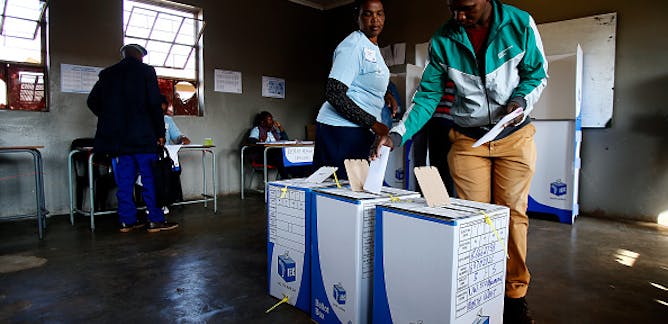
Articles on Elections in Africa
Displaying 1 - 20 of 167 articles

The Independent Electoral Commission cannot afford to put a foot wrong in the country’s most important election since democracy in 1994, on 29 May.

Two conditions enable courts to take the risk of nullifying the elections of ruling party candidates.

Zimbabwe’s 2023 elections look like their predecessors: stolen. But this one is a bit different. Opposition strategies and regional responses have changed too. What does this mean for the future?

Nelson Chamisa defines himself as a social democrat who believes in providing substantial welfare to support healthcare and basic education.

Observers regularly face dangers owing to political instability, insecurity, violence and other crises in some countries.

Dissatisfied ANC voters were much more likely to switch their votes if they held positive views of an opposition party. However, the problem for the opposition is that few people held these views.

Whichever way the ongoing armed conflict ends, the loser will be Somaliland president Muse Bihi Abdi.

Electoral violence, low voter turnout, ethnic politics and voters’ suppression were notable features of the 2023 general elections in Nigeria.

Voters speak favourably about the potential of observation to improve overall electoral quality and transparency.

Logistical challenges facing the 2023 elections remain huge given the number of political parties, the security environment and the number of contestants at various levels.

Damage to the fragile Nigerian state is one possible fallout of mixing religion with politics.

The new coalition government must act quickly to address the kingdom’s massive socio-economic problems, and restore faith in democracy.

Unable to change the country’s vulnerability to shifts in the global and regional economy, the new prime minister Matekane has few economic levers to pull.

The new governing coalition enters office amid euphoria and excitement. There are great expectations it will end corruption and fix the ailing economy.

Despite their pretensions to support reforms, it is clear that successive governments are not interested in the reform.

Angola’s 2022 election is the first in which citizens born after the war are old enough to vote.

The presence of fringe presidential contenders is a marker of maturing democracies.

The country has had five governments in 10 years. Every time a government collapses, the reform programme follows suit.

The whole idea behind independent candidates is the hope that their inclusion might improve the accountability of parliamentarians to the voters. The bill doesn’t do that.

The MPLA is using all instruments at its disposal to hobble a new united opposition front ahead of the Angola election.
